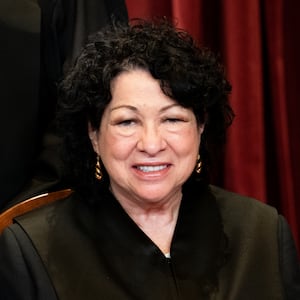After an astonishing oral argument session before the Supreme Court, it seems highly likely that there is at least some support for the former president’s position that a president can commit crimes while in office, even ones designed to help them remain in office. And what is the reasoning for this position, at least according to what we can tell from some of the questions posed by several of the justices?
The reason at least some justices seem to suggest that we cannot hold former President Trump accountable for his actual effort to spur an insurrection to remain in office is that—get this—some imagined future president might be encouraged to remain in office for fear that they might be prosecuted once they leave office.
Wait, what?
Justice Samuel A. Alito Jr. pronounced, with no apparent sense of irony, that a “stable, democratic society requires that a candidate who loses an election, even a close one, even a hotly contested one, leave office peacefully.” Agreed.
His answer to what such an outcome requires appears to be, wait for it, presidential immunity.
Under Alito’s logic, a president who feared he or she might be prosecuted after leaving office might be less willing to surrender power. And the sense that the president would get off scot-free would… encourage them to act in accordance with the law?
I guess he’s not aware of what actually happened on Jan. 6, 2021.
For Alito, it would seem that the concern about the prospect of a future president wanting to remain in office is a much graver threat than prosecuting a former president who actually tried to remain in office and encouraged a mob to storm the U.S. Capitol so that he might do so.
For Alito, the prospect of prosecuting a former president might “lead us into a cycle that destabilizes the functioning of our country as a democracy?” We can’t have that. Better to grant the former president immunity from prosecution for… trying to destabilize the function of our democracy. Better that than run the risk that some imagined, future president might get it in his or her head that it might be better to stay in office and commit crimes than face the prospect of prosecution for those crimes after leaving office.
Similarly, Justice Kavanaugh, without noting that he served on the independent counsel team that aggressively prosecuted a sitting president, President Clinton, and also with no apparent sense of irony, cautioned that the Court should really consider what a denial of immunity might mean and take into account the future implications of its decision: “This case has huge implications for the presidency, for the future of the presidency, for the future of the country.”
You read that right: at least some of the justices seemed to suggest that immunity is necessary in this case because we cannot have a president worrying that he or she might face criminal prosecution once they no longer hold office, otherwise that president might not be willing to leave that office. So, in order to ensure presidents don’t commit future crimes, we should grant an actual president who may have done so immunity from prosecution.
Indeed, we should immunize a living, breathing former president for actually trying to remain in office so that future presidents don’t fear criminal prosecution once they leave office and decide to, just as Trump did, engage in actions to hold onto their office and subvert the peaceful transition of power.
One major theme of the argument of the former president’s lawyer, John Sauer, was that never before has a president been prosecuted after he left office for alleged crimes committed while in office. Of course, Richard Nixon was pardoned by President Gerald Ford. Why would a pardon have been necessary if he couldn’t be prosecuted? But, putting that aside, one reason why no president has ever been prosecuted after leaving office is because no president, other than Nixon, has been credibly accused of committing any crime while in office, let alone the crime of trying to subvert the results of an election and remain in office.
This funhouse, “Alice-through-the-looking-glass” picture of what actually happened on Jan. 6 and what at least some of the justices seem to think might be in the best interests of the nation when it comes to prosecuting the former president is simply impossible to square with not just our constitutional history, but also simple common sense.
In reality, granting Trump the sort of immunity he seeks is far more likely to encourage future presidents to seek to commit crimes to stay in office than holding the one president who it is alleged tried to do so accountable for his actions.
But that’s not how at least several of the justices appear to see the world. Down is up. Right is wrong. It’s better to imagine what some future president might one day do to stay in office than hold the person who actually tried to stay in office accountable for his actions.







